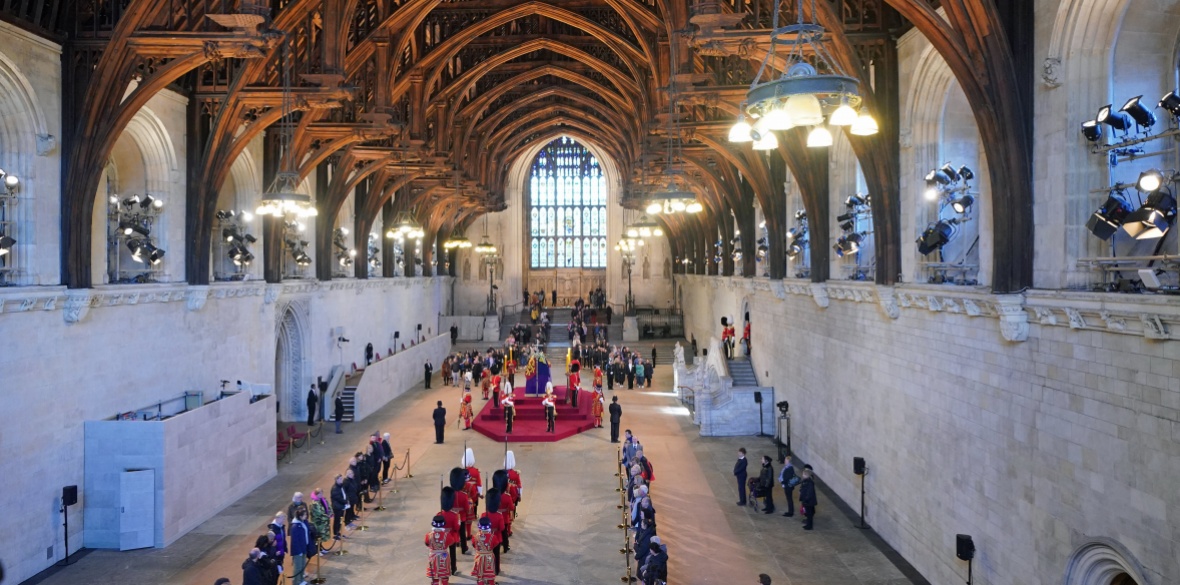This is the last article you can read this month
You can read more article this month
You can read more articles this month
Sorry your limit is up for this month
Reset on:
Please help support the Morning Star by subscribing here
FOR those who seek the radical transformation of society, the public displays of grief since the death of Elizabeth Windsor have been difficult to endure.
This is partly because the official national response is a direct affront to our views on what a genuine democratic society should look like.
But, also, because we are reminded of the extent to which ideas of deference to a hereditary head of state, and the incredibly limited notions of democracy that underpin this, are deeply embedded in the minds of large sections of the population.
In moments like this, the ideas of Italian revolutionary Antonio Gramsci can help us analyse current developments and map a way to a more progressive future.
His work reminds us of the need to be intellectually objective about the world as it is, while always retaining an “optimism of the will.”
Gramsci understood that the ruling class and its allies maintain their dominant status not only through state enforcement, but also by securing the consent of large sections of the population.
Sometimes this emerges as passive and reluctant compliance, but oftentimes support is more active and enthusiastic.
Gramsci referred to the dominant ideas that consolidate capitalist power as “common sense” – the everyday acceptance and normalisation of “the way things are.”
These ideas are most powerful when they have become so normalised that many people are unable to imagine another way of thinking, and being. They believe, literally, that “there is no alternative.”
These notions of “common sense” have been illustrated graphically in almost every aspect of the reaction to Elizabeth Windsor’s death.
Monarchy, by definition, requires an acceptance of inherited privilege and the notions of deference and conformity that flow from this.
In simple terms, we cannot even consider ourselves as citizens, with the limited notions of equality that this implies, because constitutionally we are subjects.
These ideas are then reinforced in civil society by the media but also often in schools and the myriad locations where notions of monarchy are presented as a form of incontestable truth.
At this moment it is not possible to visit a public location without being confronted by multiple images that reinforce this archaic and anachronistic constitutional arrangement.
As Raymond Williams argued, these signifiers (sometimes very conspicuous, but oftentimes not) work as a form of cultural saturation that we absorb incrementally and almost imperceptibly.
This is how the common sense becomes embedded – so deep and difficult to shift that the status quo remains intact.
However, just as Gramsci highlighted the way that dominant ideas become embedded and change can seem difficult, he also understood that there are always possibilities for resistance and that ideas are always contested.
Dominant ideas are not absorbed by people uncritically but are shaped by multiple factors including people’s own direct experiences and the alternative ideas that can help them make sense of these experiences.
At the same time that people see the saturation coverage of royal events, they also experience a cost-of-living crisis that threatens their ability to meet basic needs for food, shelter and warmth in winter. Their insecurities are palpable.
All these moments present opportunities to challenge the prevailing common sense and to pose what Gramsci called an “alternative conception of the world.”
Some of this may happen in a limited form, spontaneously. But the process is accelerated and amplified when it is possible to make direct political interventions that help individuals make sense of their experience, imagine alternative possibilities and understand their own role as part of a collective movement that can make change happen.
This is the essential role of political activists today. In short, to act as what Gramsci called organic intellectuals – organising in workplaces and communities around immediate issues, but also organising around the ideas that can develop the movement for an alternative.
This is complex and difficult work. However, there are reasons why it is important to be optimistic.
Gramsci was clear that moments of crisis cannot be relied on to bring about change, but they do shape and shift the terrain on which struggles about the future take place.
Moreover, we are not living in a crisis, but rather we live in an age of crises – public health, environmental, geopolitical, and cost-of-living.
All that seemed solid, now seems unstable and the end of Elizabeth Windsor’s reign as monarch adds another layer of instability.
What has seemed like an enduring symbol of certainty and national stability is no more, and monarchy as an institution will almost certainly come under increasing scrutiny.
The old is dying, but the new is not yet born. Outcomes are far from certain, and some possibilities threaten to take us backwards not forwards.
But there are alternatives. The challenge, as ever, is to mobilise the movement that can make these alternatives a reality.
Howard Stevenson is a Professor in the School of Education, University of Nottingham. His book on the educational ideas of Antonio Gramsci will be published in 2023.










